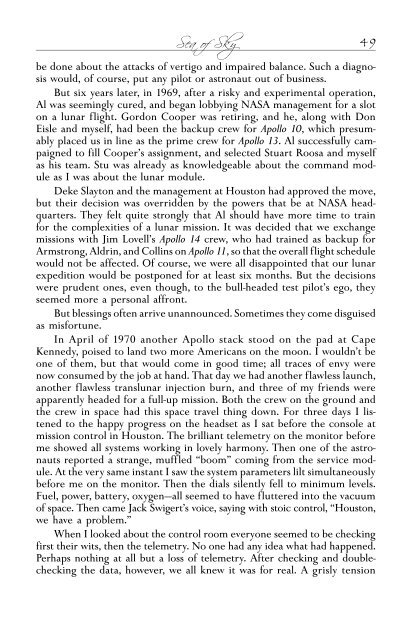edgar-mitchell
edgar-mitchell
edgar-mitchell
Create successful ePaper yourself
Turn your PDF publications into a flip-book with our unique Google optimized e-Paper software.
Sea of Grass 25<br />
safety. Though I have no recollections of rockets flaring into the night<br />
skies or the ignition of exotic new fuels, there were stories that circulated<br />
among the natives of Roswell—stories of fire and brimstone igniting the<br />
heavens, strange machinery, and a quiet, reclusive mind assembling it all.<br />
This was a man who would loom large in my imagination, a man of the<br />
proportions of my grandfather. He was mythic, and I now see how his life<br />
ran so counter to the setting he must have found himself in. Here was a<br />
man of science, a man from that vast ungodly world beyond the perimeter<br />
of Roswell. By any standard, Robert Goddard was part of the scientific<br />
lore of the times. Whenever I walked by his farm it was always quiet, yet<br />
Wernher von Braun’s rockets would continue to terrorize Londoners. The<br />
efforts of both would lay the groundwork for what was to occur after the<br />
detonation of a terrible new weapon, just outside another small town in<br />
New Mexico, that produced strange cerebral clouds in the vast distance. I<br />
recall what was the luminous glow from early tests at the White Sands<br />
Proving Grounds of the bomb that would bring the war to an abrupt end,<br />
and initiate another quiet, cold one. Of course, all of this was well beyond<br />
my field of understanding and experience at the time, and unbeknownst<br />
to me then, I would one day be very grateful for the work of my neighbor.<br />
When I was 13 I took an ad hoc job at the local airport washing fragile<br />
airplanes made of light framing and lacquered cloth. When I was 14 I<br />
soloed in one of those planes myself, and experienced for the first time the<br />
sense of freedom found only in the seat of an airplane: release from the<br />
Earth. And it was during this time in my life that I developed my own<br />
interest in science. Early on I sensed I was an engineer by nature. I came to<br />
understand farm machinery, as explained to me by my father, and airplanes,<br />
as explained by local pilots and mechanics. I came from a selfschooled,<br />
intelligent lineage that wanted me to have the finest education<br />
affordable. Because we couldn’t afford much, sacrifices would be made. I<br />
was also blessed with the attentions of rural school teachers who devoted<br />
special care to a student they believed would one day leave this town. And<br />
in 1948, that’s what I did.<br />
The administration at Carnegie Mellon must have thought a cowboy<br />
from New Mexico would make an exotic addition to their student body; I<br />
probably was, in that Pittsburgh society. Though I didn’t excel my first<br />
year, I was a serious student. At times I would see myself as I believed<br />
others might see me: a cowboy with jug-handled ears and straw in his teeth;<br />
simple, but earnest. And every now and then I played to their expectations.<br />
I used time efficiently in those days. I carried an extra course load,<br />
pledged Kappa Sigma, met and dated my future wife, Louise, and when I<br />
began to run short of funds, took a full-time job in a steel mill, cleaning<br />
slag from burned-out blast furnaces. With an equally impecunious friend I


